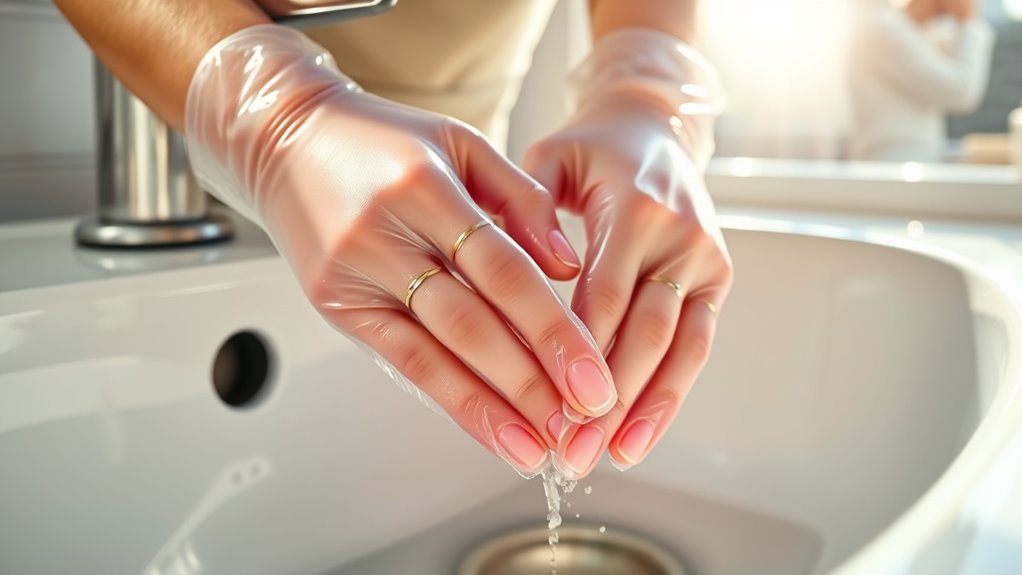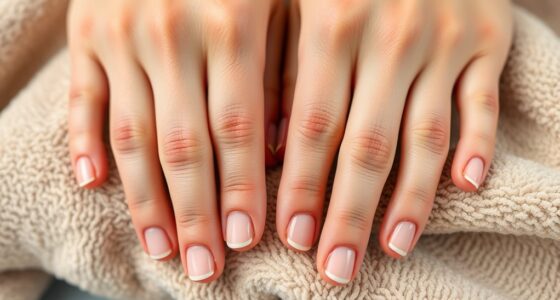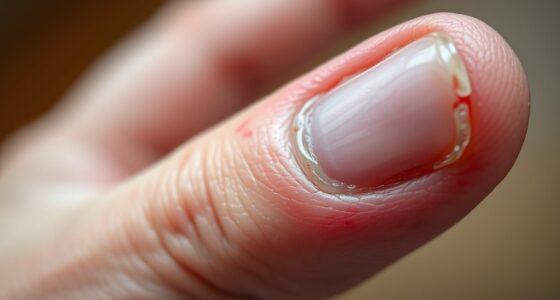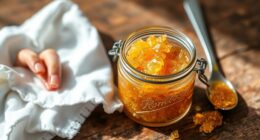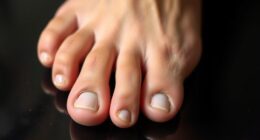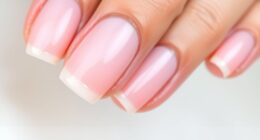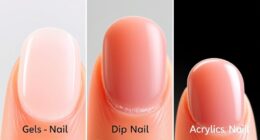To protect your nails during household chores, start by wearing the right gloves—latex for snugness or rubber mitts for heavy-duty tasks—ensuring they fit well and let your hands breathe. Apply a protective base coat before cleaning and keep your nails moisturized with oils or creams to prevent brittleness. Avoid harsh chemicals by choosing natural cleaners like vinegar, and use gentle scrubbing techniques. If you want to learn more about keeping your nails healthy, keep exploring these tips.
Key Takeaways
- Wear appropriate, well-fitting gloves (latex or rubber) to shield nails from chemicals and physical damage during chores.
- Regularly moisturize cuticles and nails with oil or cream to prevent cracking and maintain strength.
- Keep nails trimmed and filed to avoid snags, splits, and long-term damage.
- Apply a protective base coat before cleaning to create a barrier against water and harsh substances.
- Use gentle cleaning products and avoid harsh chemicals like bleach or acetone to prevent nail and cuticle dryness.
Choosing the Right Gloves for Household Tasks

When selecting gloves for household chores, it is vital to choose options that protect your nails while allowing you to work comfortably. Latex gloves are a popular choice because they fit snugly and provide excellent barrier protection against water and cleaning chemicals. Rubber mitts are also effective, especially for tasks involving heavy-duty scrubbing or exposure to harsh substances. Look for gloves that are flexible and breathable to prevent sweating and discomfort, ensuring you can work efficiently without sacrificing nail safety. The right gloves should shield your nails from chips, cracks, and water damage while letting you handle tasks with ease. Prioritize comfort, durability, and fit to keep your nails protected during household chores. Additionally, choosing appropriate glove materials can improve both protection and comfort during various household tasks, and selecting gloves with ergonomic design can further enhance dexterity and reduce fatigue. Incorporating gloves with proper fit ensures they stay securely in place and provide optimal protection throughout your chores.
Applying a Protective Base Coat Before Cleaning
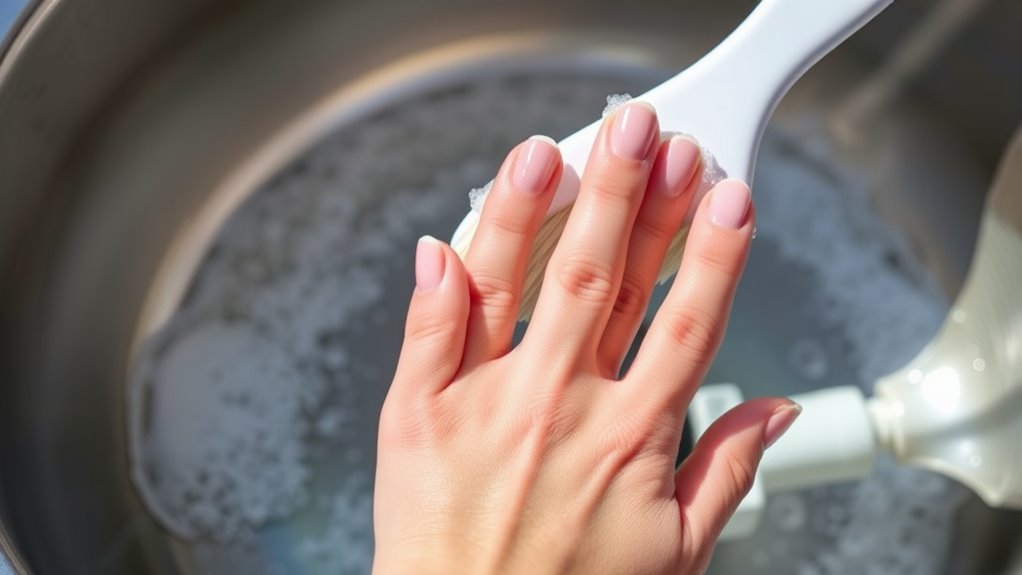
Applying a protective base coat before cleaning creates a barrier that helps prevent damage to your nails. This thin layer shields your nail polish and natural nails from harsh cleaning chemicals and water. For extra protection, apply cuticle oil around your nails before the base coat; it keeps your cuticles hydrated and flexible, reducing breakage. When you’re ready, brush a clear, quality nail polish as the base coat onto each nail and let it dry completely. This layer forms a shield that minimizes chipping, peeling, and weakening caused by household chores. Regularly inspecting your nails and using appropriate protective strategies can also help prevent nail damage from household chores. Incorporating nail strengtheners into your routine can further fortify your nails against everyday stress. Using a base coat with resilience-enhancing ingredients can provide additional support for your nails. Staying aware of technology’s role in nail care can help you choose products that incorporate innovative ingredients. Use this simple step consistently to keep your nails healthy and looking their best while tackling chores.
Using Nail Oils and Moisturizers to Strengthen Nails
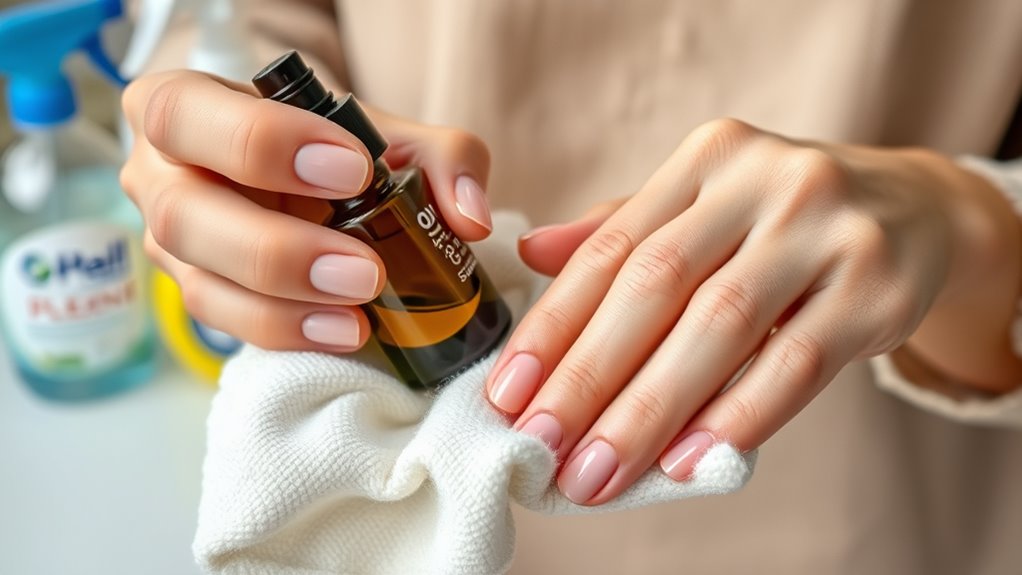
After applying a protective base coat, nourishing your nails with oils and moisturizers boosts their strength and flexibility. Nail oil benefits include reducing brittleness, preventing splits, and promoting healthy growth. Regular moisturizing routines keep cuticles hydrated, preventing hangnails and dryness that can weaken nails. To maximize these benefits, apply a few drops of nourishing nail oil daily, massaging it into your cuticles and nail beds. Use a rich moisturizer on your hands and nails after washing or exposure to water. Incorporating these steps into your routine helps maintain resilient, healthy nails that stand up better to household chores. Additionally, using humidity control devices such as mini fans or handheld humidifiers can help maintain optimal humidity levels around your nails, preventing dryness and brittleness. Research suggests that maintaining proper humidity is essential for healthy nail growth and overall nail health.
Avoiding Harsh Chemicals and Using Natural Alternatives
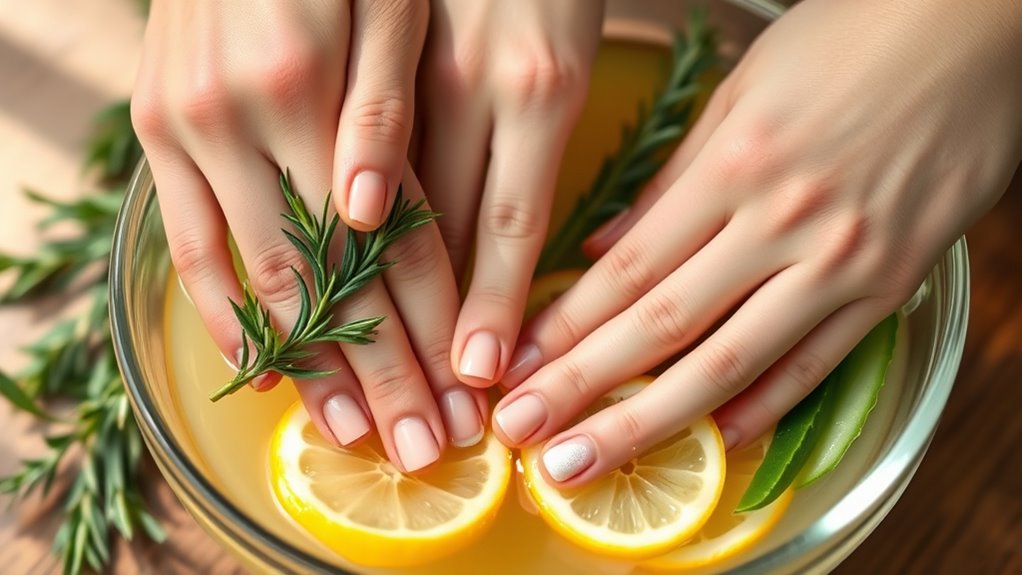
Switch to gentle cleaning products to protect your nails from damage and irritation. Natural remedies like vinegar or lemon juice can effectively clean without harsh chemicals. Making these simple swaps keeps your nails healthier during household chores. Additionally, using smart home automation devices can help remind you to wear protective gloves or take other preventative measures, further safeguarding your nails. Incorporating child-safe products ensures that even if accidental contact occurs, your skin and nails remain unharmed. Prioritizing nail health through these practices helps maintain strength and prevents long-term damage. Choosing durable, safe toys made from high-quality materials can also minimize accidental injuries that might affect your nails.
Choose Gentle Cleaning Products
Choosing gentle cleaning products is essential to protect your nails from damage during household chores. Harsh chemicals can weaken nails, cause peeling, and harm your cuticle care routine. Instead of traditional, chemical-laden cleaners, opt for natural alternatives like vinegar, baking soda, or plant-based solutions. When removing nail polish, use acetone-free remover to avoid drying out your nails and cuticles. Always wear gloves to minimize exposure to irritants, and avoid scrubbing excessively, which can weaken the nail structure. Using gentle, non-toxic cleaning products helps maintain your nails’ strength and flexibility. Plus, it reduces the risk of inflammation and dryness around your cuticles. By choosing the right products, you protect your nails and support healthier, more resilient cuticle care during household chores.
Opt for Natural Remedies
Opting for natural remedies is a smart way to protect your nails from harsh chemicals during household chores. Herbal remedies, like coconut oil or aloe vera, nourish and strengthen your nails without the aggressive ingredients found in many commercial products. Incorporate dietary supplements such as biotin or silica to support nail health from the inside out. These natural alternatives can reduce brittleness and promote growth, making your nails more resilient. Instead of relying on chemical-laden polishes or cleaners, choose products with plant-based ingredients. By integrating herbal remedies into your routine and maintaining a balanced diet with essential supplements, you create a protective barrier for your nails. This approach not only keeps your nails healthy but also minimizes exposure to potentially damaging chemicals.
Proper Nail Care and Maintenance Tips

Taking good care of your nails is essential to keep them strong and healthy during household chores. Start by removing nail polish carefully, using gentle nail polish remover to avoid drying out your nails and cuticles. Proper cuticle care is also crucial—moisturize regularly with cuticle oil or cream to prevent cracking and hangnails. Avoid biting or picking at your cuticles, which can lead to infections. Keep your nails trimmed and filed to prevent splits and snags. Wearing gloves protects your nails from harsh chemicals and excessive water exposure. Additionally, moisturize your hands daily to maintain flexibility and prevent dryness. Regular maintenance, combined with gentle removal and cuticle care, promotes healthier nails that withstand household chores better. Understanding electric power generation with bike generators can also inspire sustainable ways to keep your tools and devices charged during home projects. Proper candy storage and handling is important to prevent damage and maintain nail health during cleanup. Being aware of nail care products and their ingredients can help you select the best options for your needs. Refer to beauty store hours for shopping convenience and tips on selecting quality nail care products.
Correct Techniques for Scrubbing and Washing
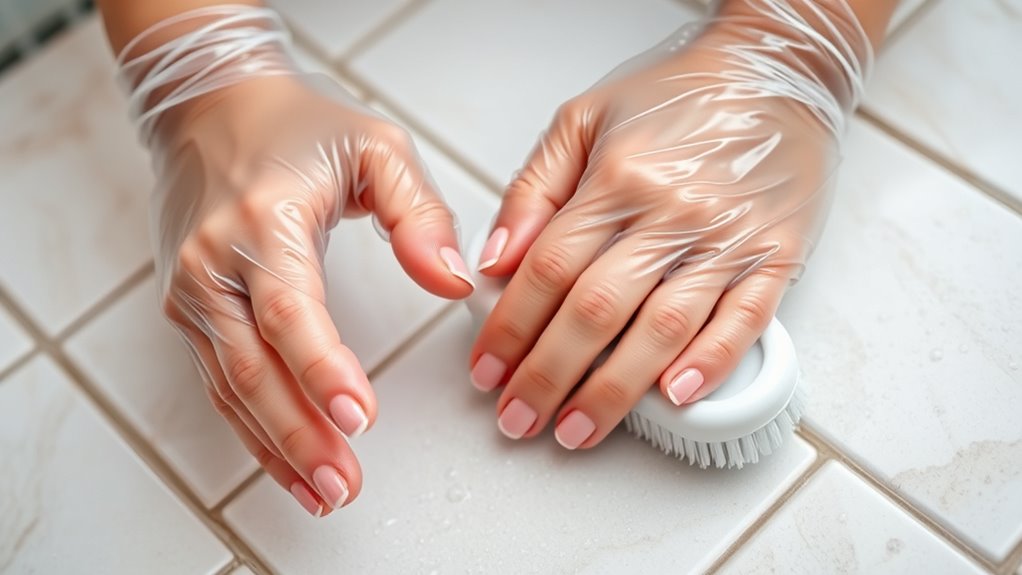
When scrubbing and washing, use gentle motions to avoid damaging your nails and cuticles. Make sure to wash your hands thoroughly with proper technique, focusing on all areas, including under your nails. This approach helps protect your nails while keeping them clean and healthy. Incorporating proper precious metals investment strategies can also help ensure your financial security in the long term. Understanding narcissistic traits can also help you recognize manipulative behaviors that could affect your mental well-being during stressful household tasks. Additionally, being aware of performance upgrades can inspire you to maintain your nails and hands better, ensuring they stay resilient against wear and tear.
Gentle Scrubbing Methods
To protect your nails during household chores, it’s essential to use gentle scrubbing techniques. Instead of harsh scrubbing, opt for light, circular motions with exfoliating scrubs that are gentle on your skin. When cleaning surfaces, avoid abrasive brushes that can scratch or weaken your nails and cuticles. Instead, choose soft-bristled brushes or cloths, applying minimal pressure. If you need to remove stubborn grime, let the exfoliating scrub do the work by loosening dirt without excessive force. Be mindful not to scrub too aggressively, as this can cause nail damage and breakage. Using these gentle methods ensures you clean effectively while maintaining healthy, protected nails. Remember, gentleness is key to preventing damage during household chores.
Proper Hand Washing Technique
Proper hand washing is essential to remove dirt and germs effectively without damaging your nails. To do this, you should wash your hands frequently, especially after household chores. Use warm water and select a gentle soap that won’t dry out your skin or weaken your nails. Apply soap thoroughly, lathering for at least 20 seconds, ensuring you clean all surfaces, including under your nails. Pay attention to areas between your fingers and around your cuticles. Rinse completely to remove any soap residue. Dry your hands with a clean towel, avoiding rough drying methods that can stress your nails. Regular hand washing with the right soap and technique helps protect your nails and keeps your hands healthy while minimizing the risk of nail damage.
Regular Nail Breakage Prevention Strategies
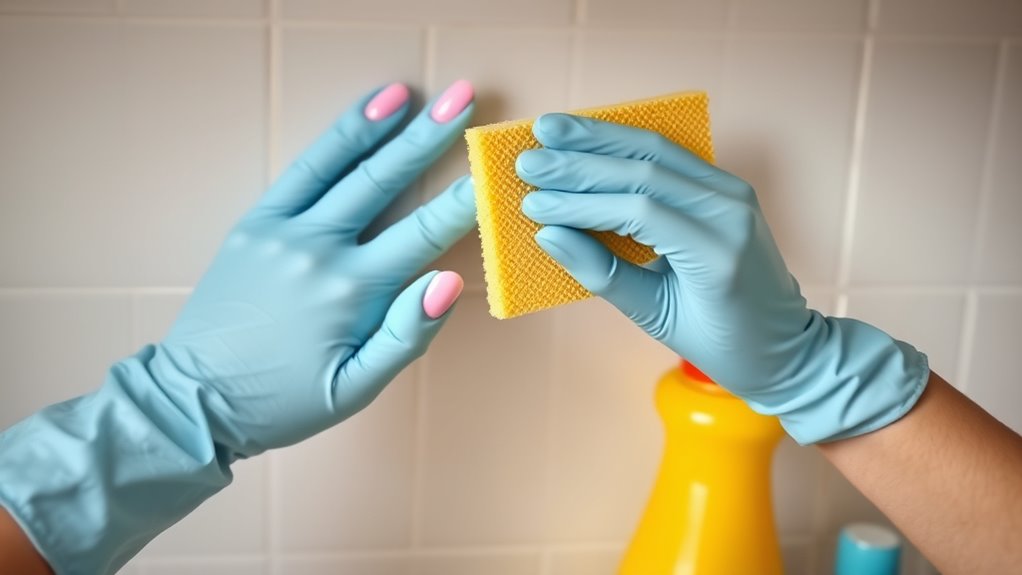
Regular nail breakage can often be prevented by adopting simple, consistent habits. To strengthen your nails and avoid breakage, incorporate effective break prevention strategies into your routine. First, keep your nails moisturized to prevent brittleness. Second, avoid using harsh chemicals directly on your nails; wear gloves during chores. Third, incorporate nail strengthening treatments, like strengthening base coats or oils, regularly. Fourth, don’t use your nails as tools—they’re more prone to damage this way. Finally, trim your nails regularly to maintain healthy edges and prevent snags. These habits help maintain nail integrity and reduce breakage risk. Consistency is key—by integrating these strategies, you’ll keep your nails stronger and more resilient during household chores.
Frequently Asked Questions
How Often Should I Trim My Nails to Prevent Damage During Chores?
You should trim your nails every one to two weeks to prevent damage during household chores. Regular nail trimming keeps your nails at a manageable length, reducing the risk of snagging, breaking, or tearing while cleaning or doing other chores. Keep your nails shaped and smooth, and avoid overly long nails. This routine helps maintain healthy nails and minimizes potential damage during your daily household activities.
Can Diet Impact Nail Strength and Resilience Over Time?
Think of your body as a fortress, where your diet impact is the foundation for nail resilience. What you eat directly influences your nails, making them stronger or more prone to breakage over time. Consuming nutrients like biotin, zinc, and vitamins supports healthy nail growth. So, by nourishing your body properly, you enhance nail resilience naturally, helping them withstand everyday wear and tear without extra effort.
Are There Specific Household Chores That Pose Higher Risks to Nails?
Certain household chores pose higher risks to your nails, especially those involving chemical exposure or moisture damage. Tasks like dishwashing, cleaning with harsh detergents, or using strong cleaning agents can weaken your nails over time. Prolonged contact with water and chemicals makes nails brittle and prone to breakage. To protect your nails, wear gloves, minimize exposure, and dry your hands thoroughly after chores. Taking these steps helps maintain nail health and durability.
What Are the Signs of Nail Damage From Household Tasks?
Imagine peeling nails after scrubbing dishes all weekend. You might notice nail discoloration, turning yellow or brown, signaling damage. Peeling nails are also common, especially if you often handle harsh chemicals or water. These signs indicate your nails are weakened or injured from household chores. Keep an eye out for such changes to catch damage early and protect your nails by wearing gloves and moisturizing regularly.
How Can I Protect Nails When Using Cleaning Tools With Rough Surfaces?
When using cleaning tools with rough surfaces, you should wear protective gloves to prevent damage and avoid direct contact. For extra protection, consider applying nail shields — these act as a barrier against scratches and chipping. Keep your nails moisturized to maintain strength, and take breaks to prevent fatigue. By taking these precautions, you’ll keep your nails healthy and looking great, even during tough cleaning tasks.
Conclusion
So, next time you’re tackling household chores, remember to protect your nails—you know, the ones that probably don’t get enough credit. While you’re busy scrubbing and cleaning, it’s ironic how neglecting your nails can lead to damage, forcing you to spend more time fixing them later. So, take a moment to care for your nails now, because ignoring them might just mean paying the price with a chipped or broken nail—what a surprise!
